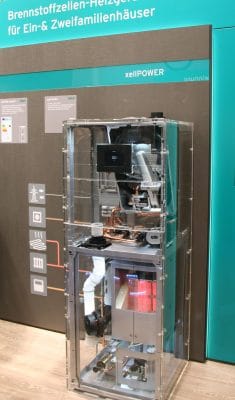Heating system manufacturer Vaillant has – again – put its fuel cell business on hold. Management announced on March 14, 2017, during the ISH in Frankfurt, Germany, that it had “reduced development capacities in fuel cells [and] put the market introduction of the fuel cell heating system for single-family buildings on hold for the time being.” Instead, Carsten Voigtländer, CEO of the Vaillant Group, intends to put a greater focus on renewable energy and heat pumps. In his view, “there currently is no fuel cell heating system that would be economically feasible for owners of real estate.”
Dresden-based partner Sunfire, which together with Vaillant had advanced the development of high-temperature fuel cells since 2009, openly criticized the decision as “hard to fathom.” Sunfire’s CEO, Carl Berninghausen, said: “[The decision] is wrong strategically. These small [fuel cell] power plants are the second essential technology besides electric heat pumps for a successful transformation of the heat market. To introduce only systems that consume but not supply power leads to a dead end in energy policy.”
After Vaillant had switched technologies for CHP units (combined heat and power) several times and had to cope with lagging behind considerably in its development, the business’s sixth generation of devices had been undergoing field tests, but had not yet reached the consumer market – in contrast to the units of many competitors (see H2-international issue from November 2016). Originally, the plan was to commercialize xellPOWER, which houses an SOFC stack by Sunfire, at the end of 2016. Despite millions upon millions of Euros Vaillant had received in subsidies for its R&D activities, these plans have now been scrapped.
Nils Aldag, COO of Sunfire, explained: “We will make the most of this surprising development and, if possible, intend to continue work on our own. The devices have met all agreed-upon requirements. It would be irresponsible to leave their potential untapped.”
Practically in response to Vaillant’s exit, Joachim Janssen, CEO of the Viessmann Group, said during the ISH press conference: “We believe fuel cell heating systems have a promising future ahead.” And the DVGW, the German Technical and Scientific Association for Gas and Water, announced at around the same time that it had signed a cooperation agreement with the IBZ, the Fuel Cell Initiative, to “establish stationary fuel cell systems on the market even faster than expected.”


























0 Comments